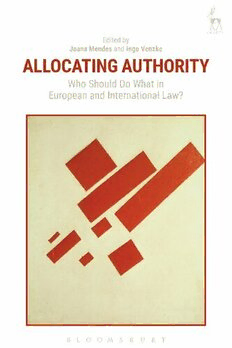
Allocating Authority: Who Should Do What in European and International Law? PDF
309 Pages·2018·4.231 MB·English
Most books are stored in the elastic cloud where traffic is expensive. For this reason, we have a limit on daily download.
Preview Allocating Authority: Who Should Do What in European and International Law?
Description:
The question of which European or international institution should exercise public authority is a highly contested one. This new collection offers an innovative approach to answering this vexed question. It argues that by viewing public authority as relative, it allows for greater understanding of both its allocation and its legitimacy. Furthermore, it argues that relations between actors should reflect the comparative analysis of the legitimacy assets that each actor can bring into governance processes. Put succinctly, the volume illustrates that public authority is relative between actors and relative to specific legitimacy assets. Drawing on the expertise of leading scholars in the field, it offers a thought-provoking and rigorous analysis of the long debated question of who should do what in European and international law.
See more
The list of books you might like
Most books are stored in the elastic cloud where traffic is expensive. For this reason, we have a limit on daily download.
